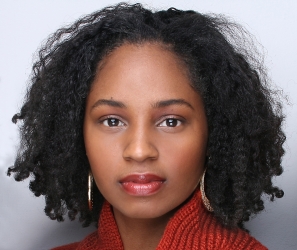Roads Taken and Not Taken: Rakia Clark' 01

Details
When I entered Haverford as a freshman in the fall of 1997, I could not have been more excited. It was a very different environment than the one I had come from, and I was eager for a new experience. My plans were to take all the prerequisites for medical school and major in something completely unrelated to science. I wanted the real-deal liberal arts experience.
Two years and one English major declaration later, I was on track. But the intellectual jolt that I felt in my English classes threw me for a loop. I felt inspired for the first time in my life. And despite my continued allegiance to the med school track, internally I found myself on shaky ground with my decision. Truth be told, I had always been clinging to it with a looser grasp than anyone else realized.
Looking back, it is clear to me how this all happened. I grew up as a promising student. And in my neighborhood, promising students were encouraged to become one of two things: doctors or lawyers. After seeing a 1980s comedy starring a defense attorney whose newly convicted client vowed to seek revenge upon parole, I quickly crossed lawyer off my list. (I was a very impressionable kid.) So purely by default, I started saying I wanted to be a doctor. A few years later, while I was still a high school student, I was recruited into a highly competitive summer program for science geeks. I did not particularly enjoy the work, but I knew I had the capacity to do it. And having not been moved by anything else yet, the whole medical school thing didn't seem like that bad an idea. Plus, it made my parents happy. Very happy, in fact.
It wasn't until my sophomore year at Haverford that I felt a strong enough stirring about books and words to contemplate a career shift. And even then, I didn't know what I'd be shifting to. I felt too deeply invested in my science pursuits to do the one thing that everyone has the right to do: change their mind.
This was a big life lesson for me. Until this point, sticking with a commitment was the hallmark of maturity and adulthood in my mind. Changing your mind was what flaky, unserious people did.
When I finally said aloud what I'd been keeping quiet for years –“Mom, Dad, I want to work in publishing” – it was such a relief. Of course this opened me up to a lot of criticism, and other, more practical speed bumps immediately followed after graduation. Did I have a job? (No.) Did I have any prospects? (Big, fat no.)
Still, I took it all in stride, begging my hometown magazine in Atlanta for an unpaid editorial internship and offering my housekeeping services to sweeten the deal. To make rent each month, I took nighttime gigs – first as a waitress and later as a bank teller. But a year later I found myself in New York City with two offers for entry-level editorial positions at major publishing houses. Oh, how the tide had turned!
It's been almost eight years since that day, and I've never once regretted abandoning everyone else's expectations to seek out my own path in the publishing world. It has been a lot of what I expected it to be (reading manuscripts, pitching new projects, developing relationships with authors) and a lot of what I didn't (negotiating contracts, going over profit and loss statements, ghostwriting entire books). It's been a great fit for me, though. I'm becoming an expert on new, little things all the time, and it makes me feel plugged in. I like that.
But my industry is taking a beating right now. Electronic media has changed the way that publishers do business, and book people have been slow to adapt. Book sales are down. Precipitously so. And because of the economic downturn, many publishers have had several rounds of layoffs. I was let go from my job a year ago, in fact.
Since then I've embraced freelancing, which, considering I don't have an entrepreneurial bone in my body, is a feat unto itself. But I dig it. The past year has been like hitting Control-Alt-Delete and rebooting my system. I've had a chance to breathe and, in a manner of speaking, gather myself. I never expected losing my job to prompt this. But it was a job that, largely, I was unhappy with. Assurances of an autonomous, boutique-y imprint that sought to develop more literary tastes turned out to be a micro-managing factory that, more than a few times, produced the book equivalent of Homeboys in Outer Space. (If you don't know what that is, consider yourself lucky.)
So to be freelancing on my own now feels pretty good. It reminds me of how I felt all those many years ago when I contemplated publishing in the first place. Is this the right move? What will people think? What if it doesn't work?
But it has worked. So far at least. And if at some point it doesn't, I'll do what I always do. I'll take a deep breath in, exhale slowly and adapt.
-Rakia Clark is a freelance book editor in New York City. Learn more about her at rakiaclark.com.



